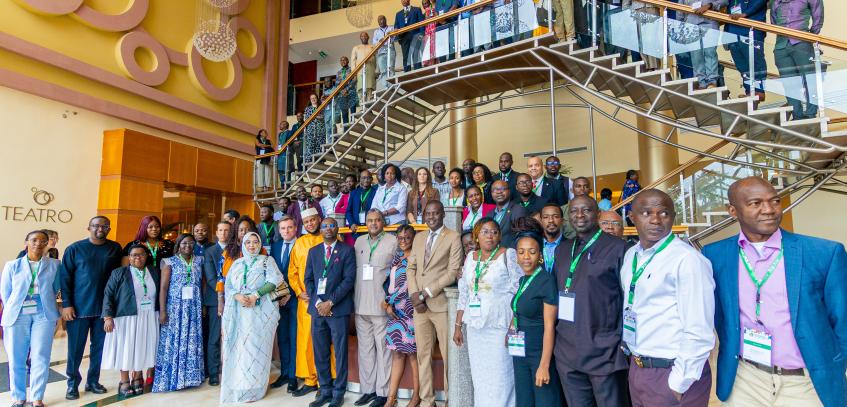The Economic, Social and Cultural Council (ECOSOCC) successfully concluded its flagship annual Citizens' Forum (4th edition), under the theme, "Reimagining Democracy and Advancing Reparative Justice: A New Social Contract."
Held from 8 to 9 July 2025, the Forum brought together more than 300 participants coming from different AU entities, Regional Economic Communities (RECs), national and regional civil society organizations (CSOs), the diaspora, traditional authorities, faith-based organizations, youth and women networks, academia, think tanks, the private sector, and strategic international partners amongst others.
The Forum reaffirmed ECOSOCC's role as the primary platform for positioning African civil society and citizens at the heart of continental governance, social transformation, and policy innovation.
Opening the Forum, Mr. Louis Cheick Sissoko, Presiding Officer of ECOSOCC, underscored the Forum's evolution into ECOSOCC's flagship participatory governance space, emphasizing that it remains dedicated to amplifying civic voices and embedding people-centred policymaking throughout the African Union's work.
Speaking on behalf of Ambassador António de Almeida-Ribeiro, Acting Secretary General of the International Dialogue Centre (KAICIID), Mr. Augustin Núñez-Vicandi highlighted that excluding religious and traditional actors from governance, development, and justice processes constitutes not only a missed opportunity but a structural blind spot that threatens the very social fabric meant to be strengthened through such efforts.
Ambassador Salah S. Hammad, Head of the African Governance Architecture (AGA) Secretariat, further challenged delegates to move beyond conceptual debates and embrace immediate action, reminding them that the promotion of peace, security, and good governance must be embraced as a collective responsibility across the continent.
Throughout the two days, participants engaged deeply in thematic sessions that explored the intersections of artificial intelligence and good governance, fiscal and climate justice, global governance reform, reparative justice, and the strengthening of health systems for human security. These dialogues consistently called for dismantling elitist barriers, addressing structural injustices, anchoring governance in cultural legitimacy, safeguarding Africa's digital sovereignty, and advancing mental wellness and ecological stewardship as core governance priorities.
Mr. Oliver Röpke, President of the European Economic and Social Committee (EESC), expressed solidarity with Africa's democratic aspirations, stressing that inclusive policymaking and participatory governance are indispensable for sustainable peace, social justice, and resilient democracies.
He further commended ECOSOCC's persistent efforts to supporting the overarching goals of EU-APSA IV initiative.
The Forum also benefited from insights by Ambassador Amr Aljowaily, Director of the Citizens and Diaspora Directorate (CIDO) at the AU Commission.
Delivering a compelling keynote address, His Excellency Mehdi Jomaa, former Prime Minister of Tunisia and Member of the Club de Madrid, called for a courageous reimagining of governance that places justice and participatory democracy at the heart of Africa's transformation.
He underscored that reparative justice was not backward-looking, but rather a forward-facing commitment to mending the social fabric so that every community, especially those historically wronged, could belong, contribute, and thrive.
H.E Mehdi Jomaa further officially launched the 'Call for Submissions' in relation with ECOSOCC's 'My Africa My Future Compendium' an initiative to showcase impactful civil society efforts advancing justice and reparations across Africa and the diaspora in line with the AU's annual Theme of the Year, with 2025 especially dedicated to themes on reparative justice. For more information on the compendium, visit https://ecosocc.au.int/en/mamf
Closing the Forum, Mr. William Carew, Head of the ECOSOCC Secretariat, thanked the Government and the People of Equatorial Guinea for their hospitality and steadfast partnership in hosting the historic gathering. He highlighted that the discussions over the two days had powerfully demonstrated that Africa's democratic renewal and reparative future demand joint effort where citizens, civil society, traditional and cultural institutions, governments, RECs, and international partners all shoulder the responsibility to build inclusive, just, and peaceful societies. Mr. Carew also used the moment to recognize the 14th Independence Day of the Republic of South Sudan, expressing solidarity with South Sudanese delegates present and symbolically honouring Africa's shared aspirations for sovereignty and dignity.
The Forum culminated in the adoption of a comprehensive Outcome Statement, which charts an ambitious civic roadmap to reimagine democracy beyond episodic elections and external benchmarks, advance reparative justice that addresses both historical legacies and present structural inequities, integrate climate and health sovereignty into governance, protect Africa's digital commons, and empower youth, women, and marginalized groups as genuine co-architects of governance systems.
The Outcome Document also calls on AU Member States to institutionalize participatory governance models, embed culturally resonant transitional justice and memory frameworks, champion fair tax and debt regimes that prioritize people over profit, and build coalitions to drive reform of global governance structures, including the UN Security Council and international financial architecture. It urges the AU to systematically anchor citizen voices into key continental processes, equip ECOSOCC with the resources needed to fulfil its mandate, and advocate robustly for Africa's collective interests on the global stage.
As the Forum concluded, participants left Malabo inspired to carry forward the shared commitments, recognizing that Africa's democratic, peaceful, and prosperous future must be authored by African citizens themselves rooted in indigenous civic rhythms, cultural memory, ecological balance, and the unyielding aspirations of its diverse peoples.
The commitments forged at the 2025 ECOSOCC Citizens' Forum will now inform AU policy instruments, guide national and regional reforms, and shape Africa's unified positions in multilateral negotiations including at COP30, the upcoming UN Second World Summit for Social Development, and under South Africa's G20 presidency. In doing so, they will ensure that Africa continues to rise on its own terms, driven by the agency, dignity, and collective vision of its people.





